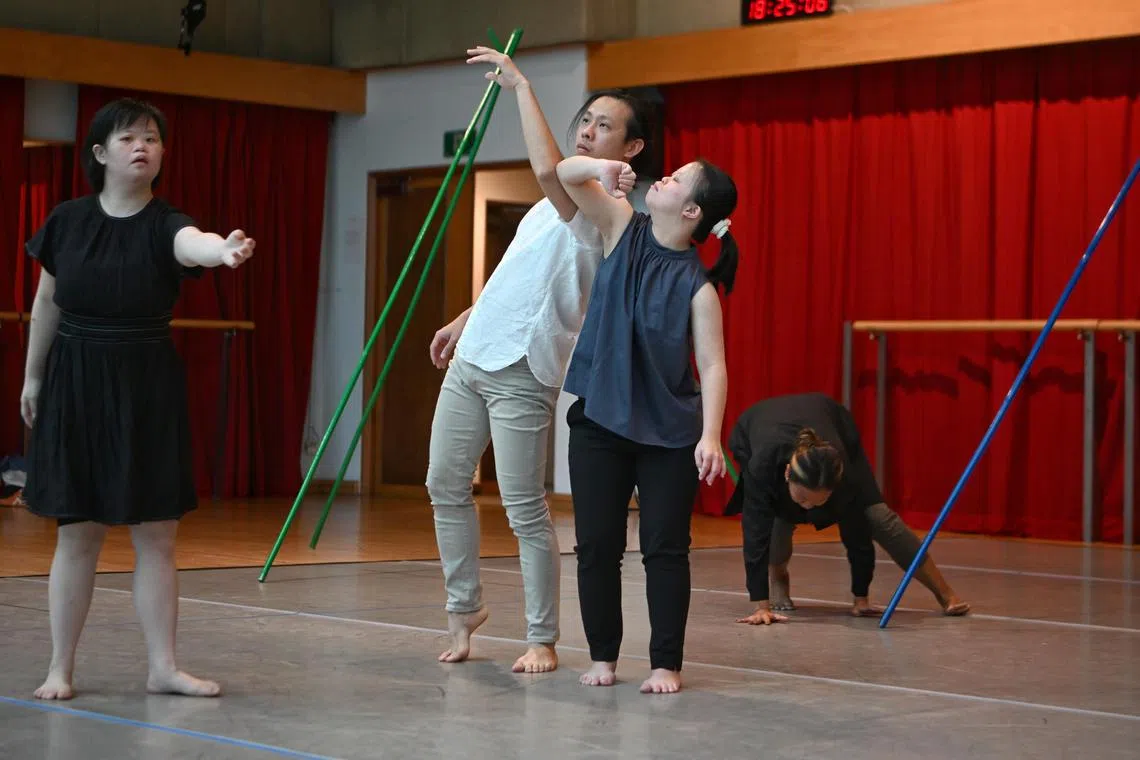S’pore dancers with disabilities collaborate with UK troupe for Esplanade performance
Sign up now: Get ST's newsletters delivered to your inbox

Dancers of all abilities during a rehearsal at Esplanade rehearsal studio on April 13, 2023.
ST PHOTO: ARIFFIN JAMAR
SINGAPORE – When one dancer looks in a certain direction, the rest notice and follow. When one moves slowly, another picks up the pace. Each performance is different, but held together by cues hidden within an intense, brooding music score.
Four dancers with Down syndrome, a deaf dancer, a dancer with smaller-than-usual hands, and able-bodied dancers are performing together for the first time in a showcase entitled A Space For EveryBody at the Esplanade on Friday and Saturday.
The result is a curious, moving tapestry.
During their rehearsal on Thursday, the 10 performers interacted with one another and with bamboo poles which formed tent-like structures around the space.
The four dancers with Down syndrome are no strangers to the stage. They are from Singapore dance company Maya Dance Theatre’s Diverse Abilities Dance Collective (DADC), which trains them in classical Indian dance and aims for them to reach a professional standard.
They have performed in Singapore and overseas in their more than 15 years of dance experience.
But they are collaborating for the first time with two professional artistes from Britain’s Candoco Dance Company, which has worked with differently abled dancers for 30 years.
“When dancing, we feel our own emotions and bodies. Dance has no boundaries and it feels amazing to express myself in the process,” Ms Jaspreet Kaur, who has Down syndrome, told The Straits Times at the rehearsal in a studio at the Esplanade.
The 42-year-old, who is a pre-school dance coach, has been dancing since she was 16. She added that she looks up Bollywood dance videos at home and brings in moves she learns to the showcase.
“I made friends with other dancers,” said 38-year-old Ms June Lin, a dancer and co-trainer with DADC who also has Down syndrome.
The idea is to get different bodies to dance together, and explore movements individually, in duets and as a group. The dancers come from various backgrounds – hip-hop, contemporary, Malay and Indian dance.
“The dancers contributed to the choreographic process, in that everything that you see in the performance is born out of the dancers themselves, guided by us,” said Candoco choreographer Ben Ash.
“In this process, we hope to reveal and bring out each individual dancer’s specific way of dancing that truly reveals their being, rather than impose a style or form upon what we do.”
He said he brought in bamboo poles as a material for dancers to work with, and a way to organise the space.
Mr Ash gives the dancers tasks such as exploring the space beneath the bamboo structures, and demonstrates it himself by sitting, standing and lying down.
After doing a full run of their 30-minute piece, the dancers sit in a circle, listening to and discussing feedback from Mr Ash.
“We have to be aware of what the other dancers are doing, so we can respond and react to them,” said Mr Muhammad Ammar Nasrulhaq, a deaf hip-hop dancer and educator. “It feels meaningful to have Paulina (Porwollik), who has short hands, teaching us,” he added, referring to a dancer from Candoco. “We have a special bond.”
A sign language interpreter attends rehearsals to translate instructions and conversations.
The performers are no less disciplined than any other dance group: For the latest showcase, they came in every day for eight hours for the week-long intensive rehearsals, taking 90-minute breaks for lunch and dinner, and 30-minute toilet breaks.
Their dance instructor, Maya Dance Theatre founder Kavitha Krishnan, attended the rehearsals to guide them and help out in case they had meltdowns.
Ms Lin, for one, has a fear of glaring stage lights, and audience members sitting near her looking at her. She has been advised to look away from the lights and towards her friends when she feels a bout of anxiety coming on.
“I’m happy then nervous, stressed and anxious. I hope I can overcome it,” she said. “I love to dance.”
Another dancer with Down syndrome, 29-year-old Arassi Rajkumar, is afraid of falling while dancing as she has had a knee injury.
As for DADC dancer and co-trainer Weng Jia Ying, she is worried about the poles collapsing. “It’s difficult to balance the bamboo. I focus on gentle and soft movements to balance it.”
Said Ms Krishnan, who is also trained as an occupational dance therapist: “When the dancers have anxiety, we teach them to stop first, start breathing, regulate their emotions, then react or respond.”
Acknowledging that it takes patience to interact with the dancers, she added: “Dancing teaches them appropriate social behaviour as they model after others, building on their independent living skills.”
The free performances at the Esplanade Concourse on Saturday are at 6pm and 7pm.


